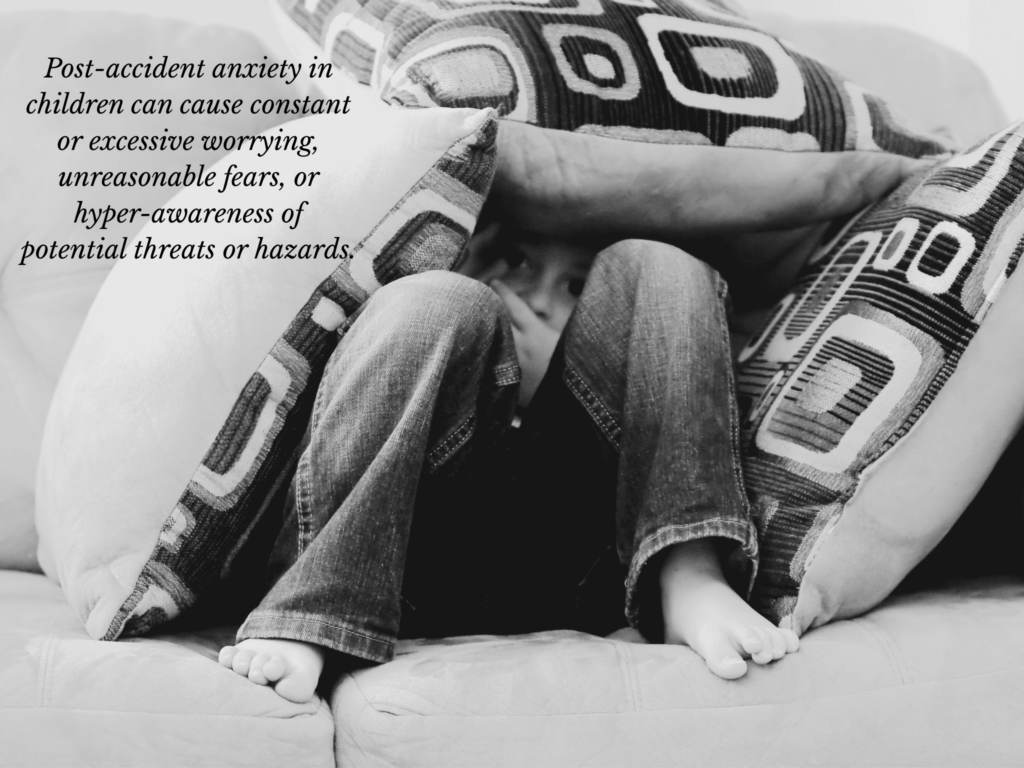After a child has been in an accident, parents tend to look for physical injuries such as broken bones, cuts, and bruises. But emotional trauma after a car accident is also very common in kids; it’s just not as easy to detect. Knowing what to look for can help adults determine how severely affected their little one is, and whether it’s time to see an expert to help the child deal with their trauma.
Signs of PTSD in Children After an Accident
Even if a child is not visibly injured and says nothing hurts, a car accident can leave them with detrimental fears and life-altering emotions. Shattered glass, flashing lights, screams, and seeing others injured around them are all terrifying things for kids to go through. Long after the crash is over, children can experience Post Traumatic Stress Disorder (PTSD), making it hard to let go of what they saw, and even experience it over and over again in flashbacks.
According to the Child Trauma Institute, children who experience trauma such as a car accident, can begin to act differently within days, weeks, or even months after the incident. They may regress and act younger, demand extra attention, or refuse to be left alone. Signs of PTSD in a child vary with age, so knowing how to recognize symptoms can help identify whether they are dealing with trauma.
In babies and young children:
- Crying when getting into a vehicle.
- Separation anxiety, in which they don’t want to be left with anyone but you.
- Hyperactivity. According to the CDC, symptoms of PTSD in children can mimic those of ADHD.
- Fear of darkness.
- Bed-wetting.
In elementary-aged children:
- Nightmares or other sleep disturbances.
- Misbehaving, or rebelling.
- Outbursts of anger.
- Loss of appetite or stomach issues.
- Changes in social behaviors, such as not wanting to play with other children.
- Loss of interest in favorite activities.
In pre-teens and teens:
- Depression; they may spend a lot of time alone in their room.
- Loss of concentration in school, resulting in dropping grades.
- Fear of driving, or not wanting to go anywhere in a vehicle.
- Insomnia, or sleeping too much.
- Alcohol or drug abuse.
Post-accident anxiety in children is common in all ages and can cause constant or excessive worrying, unreasonable fears, or hyper-awareness of potential threats or hazards.
When to See a Doctor to Address Emotional Trauma After a Car Accident
As you can see from the above symptoms, PTSD can affect children socially, emotionally, and even physically. Early recognition and professional intervention can help kids cope, preventing them from declining in school, losing friendships, and experiencing long-term anxiety.
If you suspect your child has PTSD after an accident, it’s best to contact a pediatric counselor. These professionals are specially trained to help children cope with their emotions through cognitive behavioral therapy. They can also identify whether medication can help ease a child’s anxiety symptoms while they learn how to deal with the underlying trauma.
Treatment from a child therapist is especially helpful when seeking compensation for the accident. The therapist’s diagnosis will serve as proof that the accident caused mental or emotional harm. A legal team that advocates for children will use the doctor’s testimony to ensure you receive sufficient funds from the at-fault driver to pay for therapy and any related PTSD treatments.

If My Child Has PTSD, Can I File a Lawsuit on Their Behalf?
After a car accident involving a child, insurance companies always try to pay the least amount possible to victims, even when there are physical injuries involved. They certainly don’t account for the costs of invisible injuries like post-accident anxiety in children, or how PTSD can affect kids for years to come.
Because minors have no legal standing, their parents or legal guardians must file a claim on their behalf for compensation to cover the costs of injuries (both physical and emotional). If no adult files a claim on the child’s behalf before they turn 18, the child is allowed to file their own claim once they turn 18. At Kane Personal Injury, our attorneys can help you file a lawsuit on your child’s behalf against the at-fault driver, so you can afford to get your child the treatment they need.
The most important thing to keep in mind when taking legal action is that your child cannot be blamed for the accident. In all car accidents, the at-fault driver is liable for a victim’s injuries. This is true whether the child is in your car or a passenger in someone else’s car. Our attorneys are highly knowledgeable about children’s rights and will ensure your child receives the maximum amount needed to get the help they deserve.
While lawsuit amounts will vary depending on the severity of the accident, the compensation can cover:
Therapy. Counseling is crucial for recovering from PTSD, and may be needed for years. These costs can add up quickly.
Medical treatment. A child may have hospital bills for physical injuries, but medical treatment can also include treatment for antidepressants, anti-anxiety medication, and even substance abuse due to PTSD or related inpatient care.
Loss of enjoyment of life. When children are depressed and unable to enjoy hobbies, time with friends, or attend school, they may be paid non-compensatory or punitive damages.
Lost wages. Caring for a child with emotional trauma after an accident can affect a parent’s ability to work, leading to a financial burden for the family.
Kane Personal Injury Is Here For You and Your Child
As a licensed counselor, attorney Jessica Kane has a strong desire to help kids deal with pain and trauma after accidents. She began her career as a school guidance counselor and a licensed therapist specifically to help children in need. Shortly after, she discovered that a career in law would allow her to help children and their families get compensation and closure after highly difficult situations.
While practicing law, Jessica continues to keep up her license with the New Mexico Counseling and Therapy Board. She also maintains her Pre-K through 12 School Counselor License and holds a Developmental Specialist II Certificate with the New Mexico Infant Toddler Program. Jessica and everyone at Kane Personal Injury will do everything possible to represent your child so he or she can get compensation for the treatment they deserve. Contact us today to schedule a consultation.
Please note that this article was created for advertisement purposes, and it does not constitute any contractual legal relationship, nor imply one.
